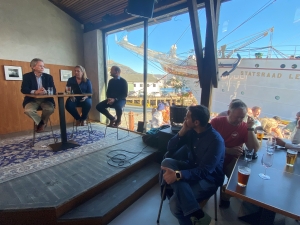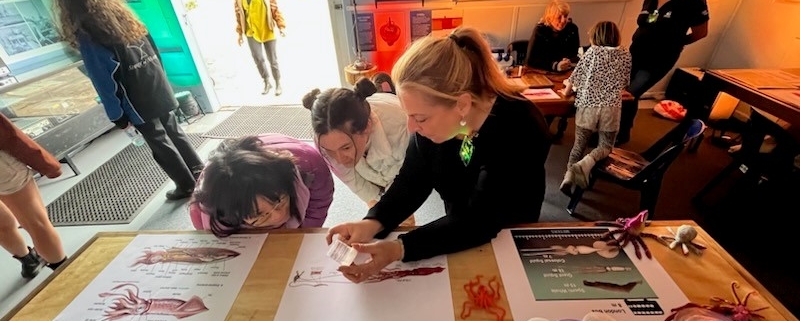Cards, cocktails in yurts and community chats help inspire climate action
As a climate change ecologist and passionate science communicator, Professor Gretta Pecl knows the challenges of talking about dire threats to the oceans and species extinction, without people feel overwhelmed and ‘switching off’.
Professor Pecl, the Director of the Centre for Marine Socioecology at The University of Tasmania, and a researcher at the Institute for Marine and Antarctic Studies, gave the plenary presentation recently at the International Conference and Workshop on Lobster (and Crab) Biology and Management in Fremantle. The presentation was on ‘Fisheries in a warming world and changing ocean: What’s in store and what’s needed to ensure a thriving future?’.
The Western Australian Marine Science Institution was a conference sponsor.
“People need to understand the oceans; how they are changing and will change and one of the best things we can do is share stories of successful adaption programs,” Professor Pecl said.
She told delegates there seemed to be an increased acknowledgement of what was happening globally.
“In 2010 we surveyed fishers and 80 percent didn’t think climate change was happening,” Professor Pecl said.
“If we surveyed the same people now, I think it would be a very different response.”
Professor Pecl is a regular presenter at conferences but told delegates creating a two-way dialogue in smaller, informal venues was just as important. She talks with people about climate change and broader science issues in podcasts, over ecology themed playing cards and even while sharing cocktails at science events in yurts (round tent-like dwellings).
“I have toured pubs doing community question and answers and people are curious and want to know more.

Professor Gretta Pecl speaks in a pub at the 5th International Symposium on the Effects of Climate Change on the World’s Ocean in Bergen Norway. Photo: Dr Jenny Shaw
“We also collaborate with media experts and psychologists because as humans we can be hard wired to not believe in climate change or to find it overwhelming to the point where it limits our capacity to take action.”
The evidence of climate change impacts is worrying. Professor Pecl said the sea surface temperatures hit 38 degrees in Florida Keys this July and heat-stressed corals began bleaching.
There were marine heatwaves on the Great Barrier Reef in Australia in 2016, 2017, 2020 and 2022.
“Reefs are resilient and can recover but the recovery period needs to be 10 to 20 years.
“They can’t be bleached year in, year out.
“Reducing other human caused pressures on reefs can help improve their natural adaptive capacity and for kelp forests, transplantation of heat tolerant phenotypes is useful.
“But without carbon emissions reduction these systems are still at risk.
“Five percent of species are at risk of extinction from 2 degrees of warming alone and that jumps to 16 percent at 4.3 degrees warming.
“The loss of biodiversity is not only an environmental issue but a developmental, economic, security, social and moral issue as well,” Professor Pecl said.
“Although oceans are changing fast, everyone is looking to the ocean for solutions.
“The ocean contains 50 times as much carbon as the atmosphere and acts as a biotic and abiotic thermostat by absorbing and releasing carbon dioxide and heat.”
Professor Pecl told conference delegates seafood had a relatively low carbon footprint compared to land base sources of food protein such as beef, lamb and cheese. Wild catch seafood rated better than aquaculture.
She said there had been a high level of coordination and collaboration in the research and industry sectors across Australia for more than 15 years and there was a well-networked research community.
“We can’t continue into a ‘business as usual’ future but it is possible to show a positive vision and create a mobilising narrative that supports action on climate change,” Professor Pecl said.

